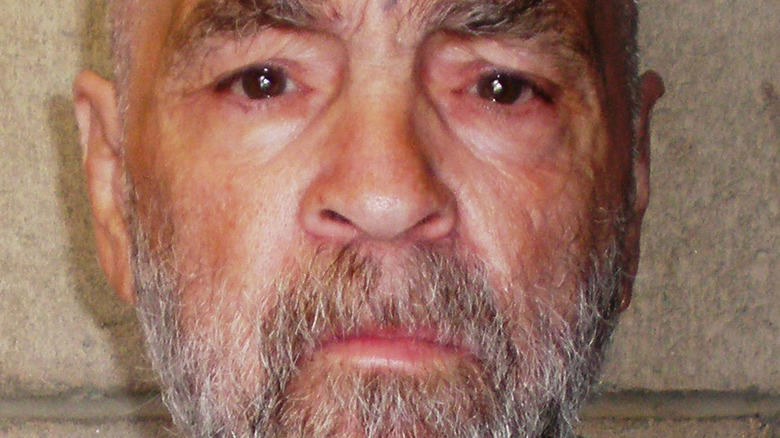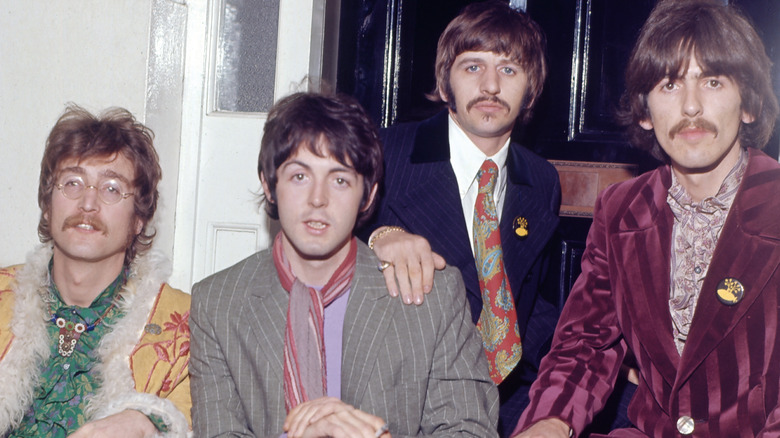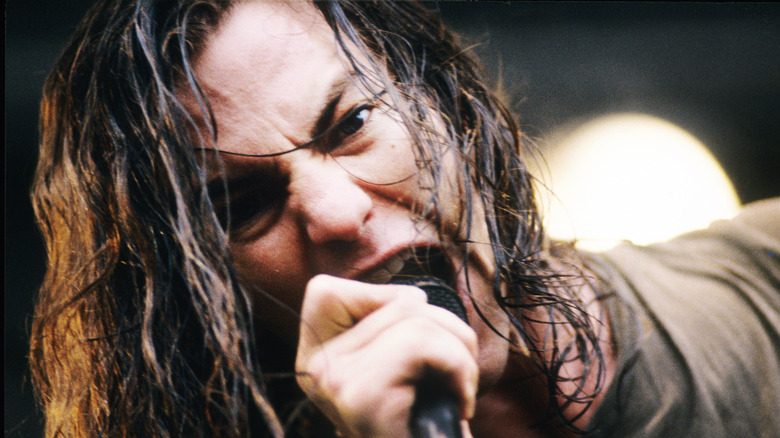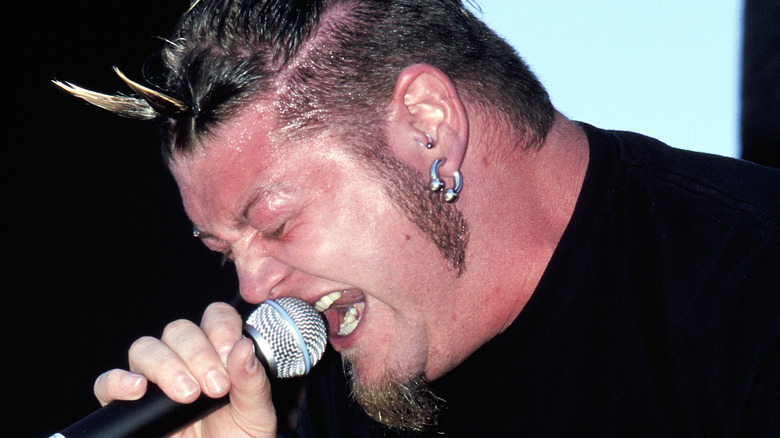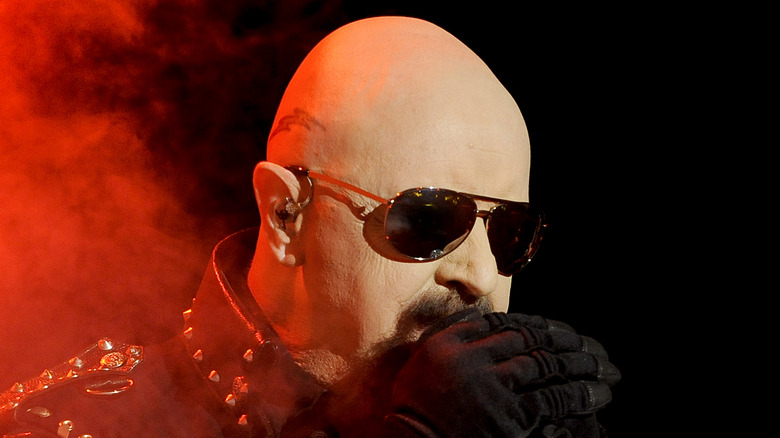Songs That Were Claimed To Have Inspired Real Life Crimes
There's long been a skeptical bent to the debate about whether violent music directly inspires violent behavior. Maybe it's the admirable American bias towards free expression, but beyond slapping a "Parental Advisory" label on explicit CD's in the 1980s — and some harsh words by Al Gore's other half, Tipper Gore – there hasn't been much of a governmental crackdown on what kinds of musical messages kids can access.
Common sense might tell you people in their teens and early 20s are especially vulnerable to catchy kinds of pop-cultural persuasions. Science says the human brain isn't even done physically forming until about age 25, according to the University of Rochester Medical Center. For this reason, research has shown young people quite literally can't make ideal long-term decisions, notes Frontiers For Young Minds. So is it any wonder some people living through the extended adolescence of modern life have purportedly been tipped over the edge by an emotional and hypnotic form of expression that resonates so personally?
Violent lyrics can create "negative emotions and thoughts that can lead to aggression," claims the Journal of Personality and Social Psychology (via the American Psychological Association [APA]). Findings like these upend a longstanding notion — going back to ancient Greek times, APA notes — that ritually blowing off some steam with metaphorical forms of mayhem is somehow cathartic. The academic inquiry will go on, but anecdotally, these killers below found twisted inspiration from their favorite songs.
Metallica fan kills his mother
In 2002 a 28-year-old man named Ronald Pituch from New Jersey picked up a dumbbell and bludgeoned his mother to death. Allegedly, she'd refused to buy him cigarettes, according to The Philadelphia Inquirer. Pituch then tied up his 5-year-old niece, hopped on his motorcycle, and fled from the scene. That's when he happened upon 11-year–old Gregory Katsnelson, innocently riding his bike to go meet with friends.
Without motive, Pituch pulled the boy from his bicycle and stabbed him, according to SouthJersey.com. Pituch dragged the boy's body to a nearby pond, hopped back on his motorcycle, and drove to a police station to turn himself in.
Pituch allegedly had a long history of mental illness. "He is paranoid, schizophrenic, suffers from manic depression," his lawyer said at trial. Pituch claimed he saw demons in the faces of ordinary people, and that the Metallica song "Ronnie" helped push him over the edge. Pituch had stopped taking his medication and began fixating on the song. "I was drinking and I was out of it. That song was always in my head, too. There was just so much pressure building up ... I caved," he explained (via the Inquirer).
The prosecution, however, successfully argued that he was sane and fully understood what he was doing. A jury agreed. The killer was sentenced to nearly 50 years, without parole.
The Beatles inspired Charles Manson
On August 8, 1969, reports Vox, Charles Manson sent four of his brain-washed followers to break into the home of director Roman Polanski. The auteur was out of town, but the maniacal Mansonites brutally murdered everyone inside, four souls total, including actress Sharon Tate, who was nearly nine months pregnant with Polanski's child. Manson believed this murder would bring about his prophecy of a race war with the Black Panthers.
Manson was obsessed with the Fab Four's "The White Album" and blamed them for what he'd done. "It's The Beatles, the music they're putting out," he said to the district attorney who convicted him of these heinous crimes, according to Rolling Stone. "These kids listen to this music and pick up the message. It's subliminal."
Manson fixated on one track in particular, "Helter Skelter." He named his race war accelerationist movement after the song, according to Vox. Lis Wiehl, a former federal prosecutor, said that that "Helter Skelter" became the cult's shorthand for the racial anarchy Manson was already preaching (via History). More clear Beatles' lines like "all you need is love" were ignored for Manson's manipulative obscurantism, which he cynically used to manipulate his flock. Paul McCartney has clarified the track is actually about playground equipment, but Manson claimed he alone could divine meaning from the innocuous lyrics. "And that meaning had directives implanted," Wiehl explained. "Rise up, do something and kill. And kill they did indeed."
The Night Stalker loved AC/DC
Richard Ramirez terrorized Los Angeles for two years in the 1980s, taking as many as 16 lives, according to The New York Times. The most frightening thing about The Night Stalker was his indiscriminate modus operandi. He broke into homes at random and did horrible violence to whomever he found inside. Ramirez would assault and kill the elderly, the young, all body types, all races notes The Guardian. He wasn't picky about "type" like other famous murderers.
The gaunt and angular Ramirez was a disorganized serial killer — best known for teeth so rotten from a steady diet of cola and hard drugs, as per The Crime Mag, he's probably the most vampiric looking mortal to ever haunt the world. Despite sticking out, he wasn't so easy to apprehend.
At one scene, Ramirez dropped a baseball hat emblazoned with the logo of AC/DC, according to The Los Angeles Times. A former classmate recalled Ramirez's obsession with AC/DC's album "Highway to Hell." The song "Night Prowler" was his favorite, with fitting lyrics: "Was that noise out your window. Or a shadow on your blind? And you lie there naked Like a body in a tomb. Suspended animation. As I slip into your room.”
Guns N' Roses song linked to three deaths
In 2002 a man named Justin Barber was found shot four times, but alive, and slumped over the wheel of his car on a coastal highway in northern Florida, according to NBC News. Justin's spouse, April Barber, was later found dead on the nearby beach. Justin told police they'd been attacked, a robbery gone wrong, but couldn't remember their assailants.
In a shocking twist, forensic evidence showed Justin had shot himself, and his wife. He was heavily in debt and stood to gain millions from an insurance policy on his spouse. A search of his computer also turned up two key pieces of evidence. The prosecution intimated Justin had researched how to survive gunshots, according to News 4 Jax, and that on the day of the murder, downloaded a Guns N' Roses track called "Used to Love Her." The song contains the refrain, "I used to love her, but I had to kill her." The track was played for the jury, and Justin Barber was convicted.
In 2012 another Guns N' Roses fan also took the life of his partner. Thomas Michael Wilhelm had been arguing with his live-in girlfriend about his sprinkler business that was apparently badly underwater. Prosecutors contended (via The Orange County Register) one night Wilhelm was drunk and repeatedly listening to those same lyrics: "I used to love her, but I had to kill her." An argument broke out and he shot Christine Marie Murray multiple times and killed her.
Teen killers allegedly copied Chief Keef
"We were bored and didn't have anything to do, so we decided to kill somebody." That was teenager James Edwards' entire explanation for killing a random man in 2013. Edwards and friend Chancey Luna were charged with first-degree murder after they snuck up on a baseball player from Australia who was out for a jog in Duncan, Oklahoma, and shot him in the back.
This stated motive is truly mystifying. Edwards told police they did the killing "for fun," according to the Associated Press (via The Christian Science Monitor). Some reporters also zeroed in on Edwards' Twitter feed, which "suggested he was planning to kill someone."
However, many of the violent posts were not original musings but rather lyrics from another teen who favors homicidal homilies — a Chicago-based rapper known as Chief Keef (real name Keith Cozart). Cozart is known for his own legal troubles and his drill music aesthetic — a style "infused with voyeuristic tales invoking violence." Three days before the killings, Edwards posted lyrics from his favorite Cozart song, "I Don't Like" — Chief Keef's biggest hit — which features the verse, "With my [expletive] when it's time to start taking lives." Edwards also made other similar posts, including violent lyrics by Chief Keef specifically referencing a desire to kill indiscriminately.
Pearl Jam's 'Jeremy' comes to life
Pearl Jam's "Jeremy" is one of the Seattle band's most iconic tracks from their vaunted debut album "Ten." The song is based on the true story of Jeremy Wade Delle, who in 1991 brought a large caliber handgun to school and, in a terrifying act of hostile masochism, shot himself in front of his teacher and classmates, according to The New Yorker.
Pearl Jam's hit and attendant video were in heavy rotation on MTV in 1992. The band's original video for the song actually featured the "Jeremy" character putting a gun in his own mouth, making it clear this song was about suicide. Pearl Jam even released a fully uncut version in 2020. The version that went to air in 1992, however, had the tragic but clarifying image with the gun in Jeremy's mouth cut from the video. The result was a muddled message that made the story of Jeremy plausibly appear to be about a school scooter who mass murdered his classmates.
That was the idea teenager Barry Loukaitis allegedly took away when in 1996 he walked into his classroom in Moses Lake, Washington, with a rifle and opened fire on his classmates, according to Rolling Stone. He shot four and killed three. His attorneys argued the video for "Jeremy" influenced the shooting. The Seattle jury even watched the video in court several times. In 2017, after a long series of appeals, Loukaitis was sentenced to 189 years behind bars, according to The Seattle Times.
Megadeath inspires a campus shooter
Kimveer Gill claimed his epitaph would read, "Lived fast died young. Left a mangled corpse," according to The New York Times. There were more clues to his derangement. The 25-year old was a cliche of disaffection, living with his parents in the suburbs of Montreal and spending his free time posting on the now-defunct goth message board vampirefreaks.com. He fantasized about killers in black and posted a photo of himself in a trench coat holding an assault rifle. "Disemboweled bodies litter the streets," Gill mused. "Some have been decapitated, others hung off bridges and overpasses."
On the morning of September 13, 2006, Gill wrote online he'd been drinking whiskey, and signed off. He drove to Dawson Junior College, stepped out of his car in a black trench and military boots, and opened fire. He shot 20 students, killing one, then turned the gun on himself.
Gill enjoyed a violent video game based on the Columbine shootings. He also loved heavy metal music. Among the killer's final blog entries was reverence for Megadeath and the band's French-language love song, "A Tout Le Monde." Gill's posts have been removed, but he wrote that the song convinced him to commit this heinous act, according to CBC. Megadeath's frontman Dave Mustain called the killer "not worthy of being a Megadeth fan," and defended his music. "I was so angry that this guy would use my song ... that he would try and turn that beautiful song into something ugly and nasty."
Linkin Park linked to a school shooter
In 2001, 15-year-old Charles Andrew Williams headed to the boys bathroom in his Santee, California, high school. No one knew what he was planning. Suddenly, the unpopular, uncool, and bullied teenager pulled a German-made .22-caliber eight-shot revolver previously concealed on his person, writes The Washington Post.
Some of his friends had an inkling of what he would do. The awkward teen was depressed, suicidal even, and had been threatening violence. But a close friend also described him as a narcissist: "He always thought he was better than everybody else." A witness in the bathroom that day, 17-year old Chris Garcia, recalled, "I went over to the sink, I washed my hands right next to him. He didn't say anything. It was all normal. ... I was walking out and I turned around and I saw him. He wasn't talking. He was just shooting everybody in the bathroom."
Williams shot 15 classmates, according to ABC News. Two would die of their wounds. A friend of Williams appeared on NBC's "Today Show" following the shooting and said the teen killer had been influenced by three Linkin Park songs: "One Step Closer," "Papercut," and "In the End." The band's publicist responded with this bit of boilerplate (also via ABC News): "Like everyone else, we are extremely saddened by these events and our hearts go out to the families and friends of the victims."
U2's 'Exit' inspired a stalker
In the late '80s, Rebecca Schaeffer was a 21-year-old starlet coming off a major-network breakout run in CBS's "My Sister Sam." The show was canceled in 1988, but the work kept coming, and Schaeffer "had quickly become a favorite of the Seventeen-reading set," writes E!.
The ingenue's rise came with a dark side: a 19-year-old stalker named John Bardo. Bardo initially wrote fan letters, mostly innocuous, but soon, they turned "ominous," authorities said at the time. Then, Bardo sent his sister this eerie letter, notes the Los Angeles Times: "I have an obsession with the unattainable and I have to eliminate [something] that I cannot attain."
Schaeffer was home one evening in 1989 waiting for delivery of the script for "Godfather Part III." So when the doorbell rang, she opened it. That's when Bardo shot her to death. Throughout his trial, Bardo sat motionlessly, recounts the Associated Press. That is until the defense played U2's "Exit." Suddenly, the killer "rocked in his chair, drummed his hands on his leg and, smiling, mouthed the lyrics 'pistol weighing heavy,'" according to The Los Angeles Times. As Bono discussed in "U2 by U2," by Neil McCormick, the song was inspired by Truman Capote's classic masterpiece, "In Cold Blood." Bardo supposedly "interpreted parts of the lyrics as references to himself and Schaeffer" and unhinged the schizophrenic killer, a psychiatrist claimed (via the LA Times). These excuses were rejected, and Bardo was given life behind bars. However, U2 stopped playing the song in concert for nearly 30 years, according to Rolling Stone.
Drowning Pool's 'Bodies' blamed for two horrific crimes
All was well for the affluent Cooke family nestled in a snowy suburb in Northern Virginia. Following a frozen pizza dinner, patriarch Paul Cooke and matriarch Margaret Cooke retired to their computers. Both volunteered for their church. Paul also doted on his stamp collection in the evenings. Their adopted 19-year-old son, Joshua Cooke, however, was feeling off that day, writes The Washington Post.
Joshua was fixated on "The Matrix," purchasing similar clothes that Keanu Reeves' character wore in the movie. He also bought a similar gun to the one Reeves used in the movie two days before he committed his crime. On that fatal day in 2003, Josh put on headphones and slid a portable CD player into his pocket, blaring the song "Bodies," by Drowning Pool, which he'd been listening to over and over for more than a year, the Post notes. First, he shot his mother in the chest, "Let the bodies hit the floor!" blaring in his ears. Then he shot his father seven times. Joshua called police and waited. He was sentenced to 40 years in prison.
In 2011 another shooter said "Bodies" was his favorite song. Jared Lee Loughner, 22, shot 18 people and killed six at an event for Congresswoman Gabrielle Giffords, reports The New York Times. Giffords was shot in the head but survived. Drowning Pool dropped this statement (via The Hollywood Reporter): "We were devastated to learn of the tragic events ... and that our music has been misinterpreted, again."
Judas Priest protected by precedent
On a dark December day in Sparks, Nevada, in 1985 two young men had a particularly twisted Judas Priest listening party. Twenty-year-old James Vance and 18-year-old Raymond Belknap spent several hours drinking, smoking pot, and listening to the band's 1978 'Stained Class' album, writes Rolling Stone.
The young men went to a local playground of a nearby church where they shot themselves at point-blank range with a shotgun. Belknap was killed instantly. Vance was hideously maimed but survived three years, according to The Los Angeles Times. Surprisingly, suicide is still prosecuted in some states under a "rarely used relic" of 13th-century common law, according to The Washington Post. In Nevada, where the two men died, lawmakers also shot down assisted suicide legislation in 2021.
Legal eagles could debate the suicide statutes here, but the victims' families felt Judas Priest was to blame for the deaths and took the band to civil court. They alleged the band's song, "Better By You, Better Than Me," had hidden subliminal phrases "Let's be dead" and "Do it." The families sought millions in damages when the case went to a no-jury trial in 1990, says The New York Times. Frontman Rob Hartford even sang the song acapella from the witness stand to prove the odd sounds heard on the record when played in reverse were just the singer's signature exhalations. The judge in the case ultimately ruled the band was not responsible for these two tragic deaths.
If you or anyone you know is having suicidal thoughts, please call the National Suicide Prevention Lifeline at 1-800-273-TALK (8255).
